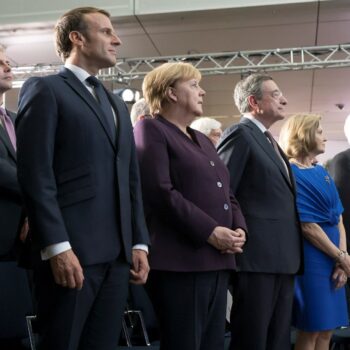With the G7 and G20 hosted by the joint COP26 Presidency countries (the UK and Italy respectively), this year’s Gs are all about pivoting the chaos and crises of the last 18 months into a climate-safe and nature-positive future for all.
The G7 can’t transform the global economy alone. To unlock political agreement on ambitious climate and nature policies and global green recoveries at crucial G20 and IMF/World Bank meetings later this year, they’ll need to send strong signals from their June meetings on how they are investing in resilient, just and green recoveries at home and fulfilling their fair share in helping all countries to do the same.
In their early foreign affairs and finance meetings in 2021, the G7 showed they can be a renewed source of diplomatic action. G7 Climate & Environment ministers in their summit last month collectively committed to aligning ambitions and sector policies with the goal of limiting warming to 1.5C.
But all these meetings failed to address significant gaps in global solidarity and leadership that are mission critical to setting up the political landing points for a true global reset over the rest of 2021. The pressure is on Finance Ministers and Leaders to demonstrate that promised support will come and that rich nations are committed to making the multilateral system work to support global recovery and sustainable development ahead of COP26.
Three key tests for Finance Ministers and Leaders in the G7 countdown
1 – Vaccine solidarity – a package of COVID vaccine support that demonstrates G7 unity and rebuilds conditions for global cooperation has to be top of the list.
2 – Finance solidarity – a comprehensive package of new commitments that address the urgent challenges developing country partners – from most vulnerable to G20 partners – are facing. What does genuine solidarity look like?
- Immediate liquidity support to stem their pandemic-induced economic crises – agreeing to reallocate IMF Special Drawing Rights and restructure debt burdens in line with the Sustainable Development goals and the Paris Agreement.
- Ensuring access to finance to invest in green recoveries in the medium term – agreeing packages of support that help countries accelerate their shifts to climate neutral pathways while financially empowering public banks (both multilateral and national) with commitments to replenish their funds, enabling them to steer investment into the global climate transition in low- and middle-income economies.
- And meeting their promises to scale up quality and quantity of finance to manage climate action and impacts – bringing individual pledges to double their international public climate finance (particularly US, Canada, France, Germany and Japan) while agreeing on how they’ll work together to scale up global delivery on the promised $100bn in annual climate finance and significantly increase support for both adaptation and disaster response.
3 – Green recovery at home – implementing green recovery plans in G7 countries is not enough. The G7 should coordinate on common standards for their domestic green recovery efforts. This is a matter of economic efficiency and political responsibility. The G7 should send clear signals on the willingness to align their recoveries, for example by adopting two high-level commitments (agreeing to a common floor for green public spending in 2021 recovery packages, e.g. a 30 to 40 per cent range, and agreeing that the rest of public spending should “Do No Significant Harm”.
Beyond these core deliverables, this year’s G7 has the best chance yet to magnify their new level of climate ambition across the world’s major emitters. Having invited Australia and South Korea as guests in the process, the spotlight will be on these countries to match the 2030 emissions reduction ambition of the G7. To leverage new ambition from these two countries into the G20, the G7 should deliver more clarity on their renewed climate ambition – clear dates for their own coal power phase outs and public and private finance reforms to get finance flows out of fossil fuels and into clean. To leverage new action from the other invited guests, South Africa and India, the G7 should demonstrate their plans to support other countries to transition their power systems.
This is the first in a two-part series on the upcoming G7 Summit. Read more in our latest blog: Who could broker a G7 agreement?



